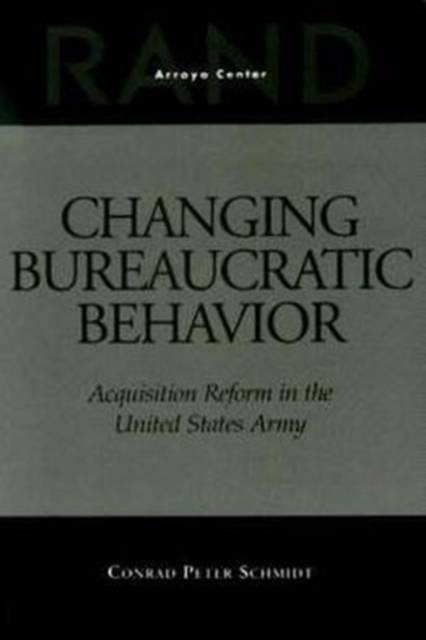
Je cadeautjes zeker op tijd in huis hebben voor de feestdagen? Kom langs in onze winkels en vind het perfecte geschenk!
- Afhalen na 1 uur in een winkel met voorraad
- Gratis thuislevering in België vanaf € 30
- Ruim aanbod met 7 miljoen producten
Je cadeautjes zeker op tijd in huis hebben voor de feestdagen? Kom langs in onze winkels en vind het perfecte geschenk!
- Afhalen na 1 uur in een winkel met voorraad
- Gratis thuislevering in België vanaf € 30
- Ruim aanbod met 7 miljoen producten
Zoeken
Changing Bureaucratic Behavior
Acquisition Reform in the United States Army
Conrad Schmidt
Paperback | Engels
€ 17,45
+ 34 punten
Omschrijving
In 1994, Secretary of Defense William Perry directed the military services (Army, Navy, Air Force, and Marines) to begin the process of reinventing their acquisition systems and policies. One of the most important elements of the Perry Initiatives was the elimination of all military specifications and standards from use in military acquisition. At the request of the U.S. Army, this study examines three policy questions: Is milspec and standard reform being implemented successfully by Army acquisition bureaucrats?, What factors or determinants affect the willingness and ability of Army acquisition employees to implement milspec and standard reform?, Having assessed implemenation to date and understanding better what affects bureaucratic behavior, how can the Army best affect the underlying beliefs and perceptions of its personnel in order to influence behavior in support of milspec and standard reform?
Specificaties
Betrokkenen
- Auteur(s):
- Uitgeverij:
Inhoud
- Aantal bladzijden:
- 140
- Taal:
- Engels
Eigenschappen
- Productcode (EAN):
- 9780833027566
- Verschijningsdatum:
- 13/03/2000
- Uitvoering:
- Paperback
- Formaat:
- Trade paperback (VS)
- Afmetingen:
- 153 mm x 228 mm
- Gewicht:
- 208 g

Alleen bij Standaard Boekhandel
+ 34 punten op je klantenkaart van Standaard Boekhandel
Beoordelingen
We publiceren alleen reviews die voldoen aan de voorwaarden voor reviews. Bekijk onze voorwaarden voor reviews.









